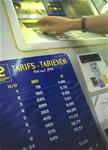The Euro areas as political exchange coin for beginners
Adelina Marini, June 18, 2009
 The knowledge about what the euro area is would be quite useful nowadays for 2 reasons: one is that in Bulgaria the euro area turned into a unifying issue of the economic platforms of parties from left to right through the political centre and, second, today the EU leaders discuss in Brussels at the European Council the proposal of the Commission for the creation of a new financial architecture in Europe. That is why euinside decided to offer you a short description of how the institutional framework of the euro area is formed, now involving 16 members. The 16th member, Slovakia, after a lot of uncertainties and hard negotiations joined on the 1st of January this year. It is the second east European country after Slovenia.
The knowledge about what the euro area is would be quite useful nowadays for 2 reasons: one is that in Bulgaria the euro area turned into a unifying issue of the economic platforms of parties from left to right through the political centre and, second, today the EU leaders discuss in Brussels at the European Council the proposal of the Commission for the creation of a new financial architecture in Europe. That is why euinside decided to offer you a short description of how the institutional framework of the euro area is formed, now involving 16 members. The 16th member, Slovakia, after a lot of uncertainties and hard negotiations joined on the 1st of January this year. It is the second east European country after Slovenia.
The legal basis for the single monetary policy is the Treaty establishing the European Community with several amendments and annexes which establish the European Central Bank (ECB), the European System of Central Banks (ESCB or the Eurosystem) and ECOFIN. An important element of political decision making is the Eurogroup, comprised of the financial ministers of the euro area member states. The meetings of the Eurogroup always precede those of ECOFIN -  all the ministers of finance. The ESCB is responsible for the price stability in the euro area. Beside this, it also supports the common economic policies of the EU. In other words, the Eurosystem is a union of the central banks and their tasks on national level. Whatever the central banks are responsible at home for, this is what they are responsible collectively on European level. With that difference that the ECB is the only body that can authorize printing of more money.
all the ministers of finance. The ESCB is responsible for the price stability in the euro area. Beside this, it also supports the common economic policies of the EU. In other words, the Eurosystem is a union of the central banks and their tasks on national level. Whatever the central banks are responsible at home for, this is what they are responsible collectively on European level. With that difference that the ECB is the only body that can authorize printing of more money.
 Here it is important for us to point out what exactly is the ECB. The Bank, which is based in Frankfurt am Main is comprised of a Governing Council, an Executive Board and a General Council. The Governing Council consists of 6 members of the Executive Board and the governors of the euro area national banks (another 16 people). Both bodies are being presided over by the president of the ECB. The Executive Board consists of the president and the vice president and 4 other members of the bank, all appointed by common accord of the heads of state of the Eurogroup. And if the Governing Council formulates the monetary policy of the euro area, the Executive Board implements it and gives the necessary instructions to the euro area national banks. And the General Council is composed of the president and vice-president of the Bank and the governors of the ALL EU member states, not only the euro area. In other words there the governor of the Bulgarian National Bank also takes part. This is the body responsible for the coordination of monetary policies of the member states that have not yet adopted the euro and the ECB with the only aim to ensure price stability.
Here it is important for us to point out what exactly is the ECB. The Bank, which is based in Frankfurt am Main is comprised of a Governing Council, an Executive Board and a General Council. The Governing Council consists of 6 members of the Executive Board and the governors of the euro area national banks (another 16 people). Both bodies are being presided over by the president of the ECB. The Executive Board consists of the president and the vice president and 4 other members of the bank, all appointed by common accord of the heads of state of the Eurogroup. And if the Governing Council formulates the monetary policy of the euro area, the Executive Board implements it and gives the necessary instructions to the euro area national banks. And the General Council is composed of the president and vice-president of the Bank and the governors of the ALL EU member states, not only the euro area. In other words there the governor of the Bulgarian National Bank also takes part. This is the body responsible for the coordination of monetary policies of the member states that have not yet adopted the euro and the ECB with the only aim to ensure price stability.
The euro area is something much more than it looks like at first glance - just a bunch of countries that share one and the same currency. Each, relatively literate citizen, knows that having the currency leads to a lot of responsibilities because this is entirely related to the real economy. While the individual economies that now comprise the euro area may be considered small and open, the euro area as a whole forms a large, much more closed economy that can be better compared to those of the US or Japan than to individual euro area countries, even if it was Germany. This is very important to know.
Secondly, fiscal policies have a significant impact on economic growth and inflation, which is not news but it's good the Bulgarian politicians to have it in mind when they wave their economic  platforms or write their speeches. There are many channels to follow fiscal policy developments closely, like the level and composition of government expenditure and revenue (here the economic advisers of the BSP should read more carefully) , as well as budget deficits and public debt (this is being noted as a serious threat by GERB, the Blue coalition and the NDSV).
platforms or write their speeches. There are many channels to follow fiscal policy developments closely, like the level and composition of government expenditure and revenue (here the economic advisers of the BSP should read more carefully) , as well as budget deficits and public debt (this is being noted as a serious threat by GERB, the Blue coalition and the NDSV).
Budgetary po;licies remain the exclusive competence of the member states and, as usual, there is one big HOWEVER, there are a number of institutional arrangements at the EU level in order to ensure sound public finances. In particular the excessive deficit procedure - the nightmare of countries like Germany, France, Spain and Greece and since recently couple of others. This procedure is one of the milestones in the Stability and Growth Pact which is the framework under which member states have their own monetary policies but without breaching the 3% limit of the budget deficit.
 For example, an excessive increase in government spending at a time when the economy is already operating at close to full capacity could lead to inflationary pressures. Fiscal imbalances, with large budget deficits and mounting public debt also lead to serious inflation increase. That is why fiscal discipline is a basic component of macroeconomic stability, which, if it wasn't for the pre-election talking, we shouldn't have discussed as it is, to put it straight - an elementary truth for every beginning macroeconomists.
For example, an excessive increase in government spending at a time when the economy is already operating at close to full capacity could lead to inflationary pressures. Fiscal imbalances, with large budget deficits and mounting public debt also lead to serious inflation increase. That is why fiscal discipline is a basic component of macroeconomic stability, which, if it wasn't for the pre-election talking, we shouldn't have discussed as it is, to put it straight - an elementary truth for every beginning macroeconomists.
And with regard to the supervision, according to the institutional accords of the EU, all participants in the euro area are obliged to submit stability programmes to the EU Council or the Commission. The non-participating countries have to submit convergence programmes. Both contain information about the budgets of member states in the mid-term so as to see whether there would be close-to-balance or in-surplus position.
A significant addition to fiscal policies, directed to stability, is the no bail-out clause or, in other words - no stimulus plans like the ones president Obama implemented in the US. Why? Because in  the documents it is said: "This clause ensures that the responsibility for repaying public debt remains national. It thus encourages prudent fiscal policies at the national level.
the documents it is said: "This clause ensures that the responsibility for repaying public debt remains national. It thus encourages prudent fiscal policies at the national level.
What is the new proposal of the Commission for financial supervision, you can read on euinside here.
 Angela Merkel, Emmanuel Macron | © Council of the EU
Angela Merkel, Emmanuel Macron | © Council of the EU Benoit Coeure | © Council of the EU
Benoit Coeure | © Council of the EU Pierre Moscovici | © Council of the EU
Pierre Moscovici | © Council of the EU